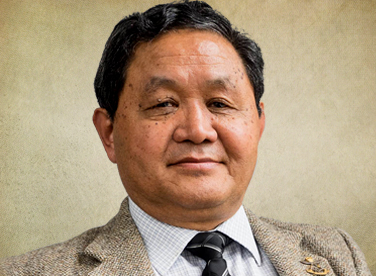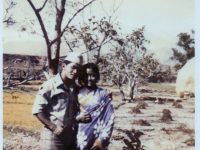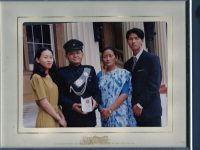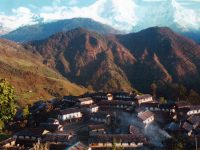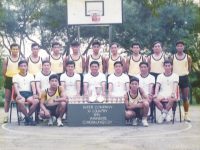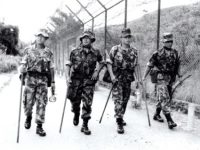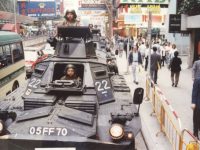Major (Ret’d) Udai Gurung, MBE
Major (Ret’d) Udai Gurung, MBE
(Portrait © Gurkha Voices Oral History Project)
-
Udai with his wife Buddhi
-
Receiving an MBE
-
Ghandruk 3, home village
-
Audio 1
-
Audio 2
-
Audio 3
-
Inter Company X Country 1991
-
Hong Kong border patrols 1980
-
Hong Kong presence, 1980
Major (Ret’d) Udai Bahadur Gurung MBE served in the army for thirty one years achieving the highest promotion to Major as a Gurkha Commissioned Officer in 1991. His postings included a period of time as the Company Commander of the Falkland Islands after the war and deployments to Belize, Hong Kong, Australia, New Zealand, Guam, Germany, Hawaii, Kosovo, Brunei and Cyprus to name just a few of them!
At the beginning of his career Udai specialised in Signals and worked on the Hong Kong border patrol. During his training he was nominated for best champion recruit in his regiment, coming fourth out of three hundred recruits.
After retiring from the army in 2000, Udai began a long term career in the civil service and is currently the Commandant East Anglia Training Area in the Defence Infrastructure Organisation, near Colchester. Udai is the former President of the Colchester Nepalese Society and still participates as an advisor, helping the Nepalese community in the local area.
Udai features in our short film which can be viewed on our website here.
(More of Udai’s stories are in our book, published later this year. Keep posted via our blog: www.gurkhastories.wordpress.com)
Audio 1 (1 min 25 secs)
British Gurkhas are well respected in Nepal. Whenever you join, if you like to join the army then you like to join the best don’t you think so? And in our days it wasn’t very difficult to join because we didn’t have to carry seventy five kilogram on your back and walk up and down the hill. They used to do initiative test for us and I was pretty good at it so I was chosen just like that [smiles].
We were enlisted in a place called Paklihawa in West Nepal and did our training, bits and pieces, in Nepal. And then came to Sunei Petani in Malaysia, did our nine months’ training where we did all the basic recruit training as well as military training as well as everything, jungle training, everything and then transfer to our regiment, 6th Gurkha Rifles in 1970 in Hong Kong.
During that period you learnt the language. In our time we did Roman Gurkhali, not English. So we learnt Roman Gurkhali and then– whatever we were taught in Nepali or Roman Gurkhali we had to translate that into Nepali and then understand. And then similarly then when we are changing to English, the medium of the Gurkhas became English, we need to change everything from Roman Gurkhali to English. So it was a bit of a difficult situation there.
Audio 2 (1 min 10 secs)
I was there for four months and…because I was the Reinforcement Infantry Company Commander. So everything was on me to look after Falkland Islands. So that was a big responsibility for a Gurkha to be the Reinforcement Infantry Company Commander and I took it very seriously.
Before I took over the command of the Company I had organised training for them, what they are going to be doing while they are in the Falkland Islands and I have deployed every– my small detachment around the island to look after the farmers, help the farmers with some ship around. And I used to go from one place to another by helicopter and join the ship and she would take me to another place and then jump into the helicopter and then come back. So I spent really, really, really good tour there and I was also recommended very highly by the British Forces Falkland Island Commander as well. I loved it!
Audio 3 (45 secs)
I like Brunei because my wife likes that as well, the place. Such a nice place, you don’t have to wear like this [winter coats], short sleeve order all the time. Easy peasy!
If I could rejoin the army I would do the same again. I like the army life so much. And the army, the Queen and the country has given me so much that I have educated my two children in the best universities possible and they are now doctors and I.T. professional. So I like to do that again if I can and I would like to send my grandchildren in the same way as I sent my son and daughter in the universities.
Oral histories: © Gurkha Voices Oral History Project

